|
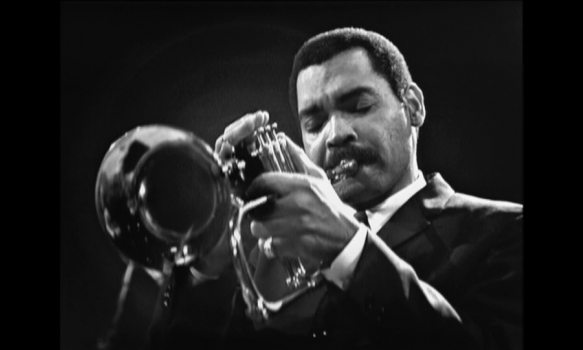 `qs e`qldqisqtlodsj `qs e`qldqisqtlodsj
The sound of the trumpet corresponds to the soprano of vocal
music in the sound range, and it is very brilliant in the tone color. The
trumpet is usually the most prominent part in the brass band. Even in
jazz, trumpet players are more prominent by flashy performances. Art
Farmer is not the type of such a typical trumpeter. His performances are
noticeably noticeable. He is, therefore, frequently participating in
recordings of various other musicians as side man. That is because he can
skillfully support the playing player while keeping his own play style. In
his leader album, he places great importance on ensembles with other
performers, so his own solo part only does not play outstanding. I would
like to describe the characteristics of his performance as "self-restraint
dandyism". At the same time, I feel good in his performance. He ignores
the co-star and suppresses himself playing his own trumpet. Since he does
not exaggerate the audience and add exaggeration or excessive enthusiasm
to the performance, he does not degenerate the performance vulgarly. His
playing trumpet is a slightly faint tone, and there is no flashy
brilliance. While considering the margin of the harmony, he will make a
phrase to fumble and look for the next sound. The melody he produces moves
steadily within the midrange, so it never interferes with other
performers' solo performances.
He played with
Clifford Brown at the beginning of his activity - the time when he forms
his play style. Brown is a genius trumpet player in the history of jazz.
Brown was a player like the brightly shining sun for the people of those
days. Brown played a trumpet with a slow and shining sound. And, he
performed an impromptuely improvised creative phrase with key points of
the performance. Brown had a great influence on many trumpet players. For
future generations the trumpet player has taken the style of Brown as the
standard and learned the style of his own trumpet. Art farmer aged Brown's
closest while aging the style of singing its own melody without being
swallowed by the influence of Browne who is different from herself. I
think this was a very difficult thing. Art farmer pioneered its own style
apart from the mainstream at that time.
A person listening to
his performance is enjoying tasting the taste enthralled in his casual
expression.
|
Sing Me Softly of
The Blues
@@@PXUTNR^¹
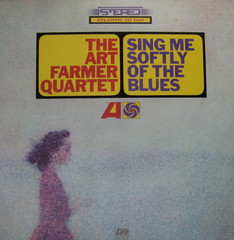 Sing Me Softly
of the Blues Sing Me Softly
of the Blues
Ad
Infinitum
Petite Belle
Tears
I
Waited for You
One
for Majid
Art
Farmer(tp)
Pete La Roca(ds)
Steve Kuhn(p)
Steve Swallow(b)
This album is a work in which the
lyrical nature of Art Farmer appears well. Despite being a one-horn
organization that Farmer joined the piano trio, he kept on
suppressing his own horn, letting the piano and bass player beyond
the frame of accompaniment before putting it forward. As a result,
the ensemble of 4 players gives lyrical performance and tension to
the lyrical performance that is characteristic of art farmer. He is
playing a flugelhorn, not a trumpet. In the flugelhorn, the sound in
the middle low range is softer than the trumpet. If you listen to
the second song "Ad Infinitum", you can taste the sound of
flugelhorn. You will first hear the heterogeneous sounds from the
hard bop at that time in the intro by the dispersed chords of a
crystal piano like a star. And Farmer's flugelhorn plays the theme
clearly. After that, unusually, we play the theme together so that
the piano cuddles the flugelhorn. Presentation method of this theme
is not common. Then a piano like a flood of dispersed chords. In
this song, piano is featured more than flugelhorn.
At the third
song "Petite Belle," you will be able to enjoy his solo performance.
He uses a flugelphone featuring a soft tone and plays to sing a
theme straight. As soon as he moves to ad lib, he plays an
unobtrusive and elegant phrase without destroying the atmosphere of
the theme. When reading the comment I wrote, do you think that his
performance is a mellowy droop that did not get rid of as a beat. If
so, that is a totally misunderstanding. He is not the type to play
alone as a self-ingrained person. In this song, a crystal resonance
piano and unique drums are adding a clear break to his performance.
As a result, you will feel moderate throughout the performance. In
the fourth song "Tears", the introduction of a fine distributed
chord by the piano sounds like a flood. Through this album, the
crystal sound of Steve Kuen's piano is impressive. His melancholy
free gel phone appears as if it springs up from the sound of the
piano like a flood. With this, the whole performance suddenly
transforms into an aesthetic and decadent atmosphere. In the
subsequent ad lib, we play violent performances like piano and drums
intertwine. His flugelhorn is playing violently in conjunction.
However, due to his self-restrained style and the influence of a
cold hard sound like the piano's ice, as a whole, it will not become
hot. I want to say that their performance is an intelligent or
magical burning performance that keeps enthusiasm inside. The fifth
piece of "Petite Belle" is also the same for their intense
performance.
Rather than his
leader album, he is finished like he participated in a piano's trio
of Steve Kuhn. This is because Farmer has made their abilities.
Where such things can be done, the characteristics of Farmer are
well manifest. By making their abilities, he created a sound that
can be called a ghost
. |
| The Summer
Knoows @@@PXVUN^¹
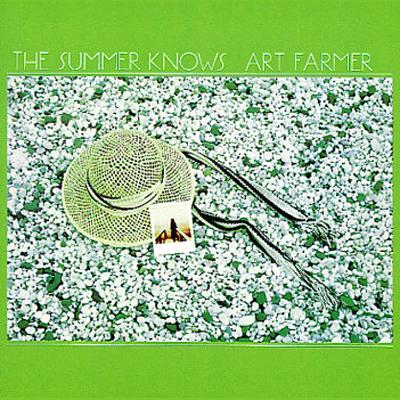 The Summer
Knows The Summer
Knows
Manhã Do Carnaval
Alfie
When I Fall In Love
Ditty
I
Should Care
Sam
Jones(b)
Billy Higgins(ds)
Art
Farmer(tp)
Cedar Walton(p)
In this album, art farmer played flugelhorn, exposing
his lyrical character to the fore. He plays ballads and slow numbers
of popular standard numbers, singing a melody with the formation of
one horn. You should not be deceived by the sentimental mood of a
jacket girl's hobby. He does not express his own emotions straight,
and he is keen to tie it to an impressive sound by controlling it.
His self-restraint attitude is a cool play and fruition. That is why
he is creating simple beauty without adding extra decorations, such
as trying vibrato behind this, trying to change the tone, and so on.
By suppressing unnecessary expression, he has a lingering finish.
You listen to his performance as you imagine the line spacing when
reading a novel. There is a characteristic of farmer's lyricism. It
is 'beauty of restraint'. The seriousness of this farmer makes the
listener feel the dignity.
At the first
song "The Summer Knows", he uses the soft tone of flugelhorn and
blows a cool sentimental melody. A short pause attracts your
attention because it is exquisite how to take a slight pause of his
phrase here. As a result, you can feel a sense of reverberation. He
repeats this melody over and over, but sometimes it inserts an
improvising phrase as it flows from the melody. This improvised
phrase is short enough to be said to be inorganic, short but it is
creating a neutralizing effect on the subject's sentimentality. That
is a halt to your immersion in sentiment. You can have a good
distance feeling with the performance, so you can afford to feel the
reverberation in the performance. And since the rhythm section of
the back carves a solid rhythm, it gives sharpness to the
performance. At the second song "Manhã Do Carnaval" they raise the
tempo and start a bit intense performance of Bossa Nova style. He is
playing a humble but humble note with a sharp sound of a sharp edge
this time. From here, the third song "Alfie" starts without
interruption. From the impressive intro of the piano, it slowly
drops the tempo, and he sings with flugelhorn. This place is a white
eye in this album. In the past he has done a good performance with a
lyrical pianist like Steve Kuhn or Bill Evans. The piano with this
song has a lyrical taste similar to them. He made the pianist's
lyricism well demonstrated. Also, the elastic acoustic bouncing
sound of the base is occasionally impressive, he makes good use of
the back, and as a whole his flugelhorn unites with the back and
produces thick
music. |
| Modern
Art @@@PXTWNR^¹
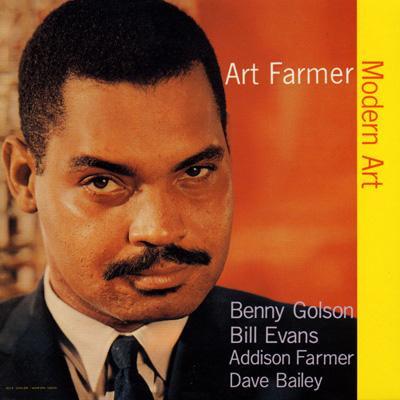 Mox
Nix Mox
Nix
Fair Weather
Darn That Dream
Touch of Your Lips
Jubilation
Like Someone in Love
I
Love You
Cold Breeze
(03:53)
Addison Farmer(b)
Art
Farmer(tp)
Benny Golson(ts)
Bill Evans (p)
Dave Bailey(ds)
In the handbook of jazz, this album is generally
regarded as his masterpiece work. At the time of recording in 1958,
when hard bop was popular, he also performed as a hard bucker.
However, he did not reach Clifford Brown in the technique, and in
lyrical play it did not match Miles Davis' cool. He was incomplete.
It is this album that half fruit was fruited as his personality. In
pursuit of a lyrical performance that makes the best use of the
taste in posterity album, in this album he was seeking without
finding out his own direction. For example, he plays a hot play not
to play in posterity with this album. His performance in this album
was surfacing the original clumsiness, and he overcame her clumsy
later in the year and moved to a sophisticated performance. But in
the album, his awkwardness is rather producing a rich flavor. This
taste was easy for jazz fans who liked hard bop.
He formed a
group named Jazz Tett with Benny Golson, an arranger who is also a
tenor saxophonist for a while. This album was a pioneer of it.
Galson's saxophone style places importance on the sideways flow.
Therefore, some people hate that his style is not sharp. However,
because Golson did not interfere with Farmer's self restraining
play, they continued cooperative play as a two-headed component.
Bill Evans of the piano was in a state just before participating in
the recording of "Kind of Blue" under Miles Davis. In this album,
Evans has not yet found its own play style later.
The first song
"Mox Nix" has a unique intro of the piano. Evans' piano begins an
impressive performance that will lead to later Evans, with a
decorative sound that swings the cord while swinging. And Farmer's
trumpet and Golson's tenor perform minor themes at Unison. They
perform improvisation with solo in turn in the order of Farmer,
Golson. It's drums and bass playing an active part here. They are
pushing the whole group's performance and pulling them with rhythm.
His play there is not a style to sing a melody in later years, but a
style that plays an analytical fine phrase of Bebop quietly. This is
strangely tasty. After him, Golson eventually compensated for his
irresistible play, playing the phrase as smoothly as possible,
contrary to him. And by contrast with the performance of Golson, the
characteristics of his performance appeared. The first and second
songs "Fair Weather" are distinguished by the piano intro's
uniqueity, but overall it is a typical minor bop number. They are
playing it tastily. The third song "Darn That Dream" is a slow
number and he is playing lyrical. In this song he plays melodies
indiscriminately. His performance is restrained and simple, but
there is a reverberation. Here is the sprout of his lyrical
performance later in the year. In this album, both the pioneering of
his characteristic lyricism of the later years and the hard-bop jazz
play like the first song live together. For some people, this is
halfway reflected in posture. However, even with lyrical or hard
bop, his attitude that is absolutely outstanding is sincere and
respectful. As a result, it has become a fruitful
one. |
| Art
@@@PXTWNR^¹
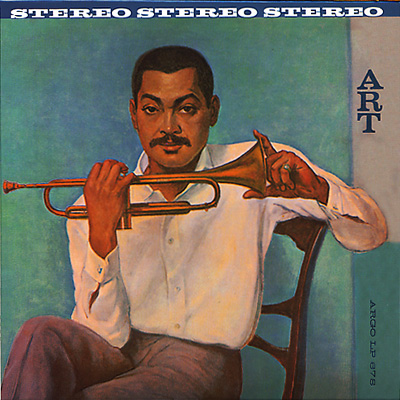 So
Beats My Heart For You So
Beats My Heart For You
Goodbye, Old Girl
Who
Cares?
Out
Of The Past
Younger Than Spring
The
Best Thing For You Is Me
I'm
A Fool To Want You
That Old Devil Moon
Art
Farmer (tp, fh)
Tommy Flanagan (p)
Tommy Williams (b)
Albert Heath (ds)
Art Farmer participated in many sessions as side men in
the 1950s. And beginning to record his own leader album from the end
of the 50's. The album that best describes his character is a
performance by one horn formation with such a trumpet. It is a big
deal to attract people who listen with a trumpet through an album
without getting bored. In fact, there are few trumpet players
recording albums with trumpet's one horn. Moreover, if there are
many songs of slow or medium tempo like this album, it can not be
pushed by riding the up tempo, and a heavy burden is applied to the
talking point of the trumpet. This album seems to be made casually,
but I think that it is actually a very strange thing.
This album is
composed mainly of medium or slow tempo standard numbers. For
example, the second song "Goodbye, Old Girl" is a slow ballad. He
played trumpets quietly with long phasing. In the fifth song
"Younger Than Spring", the introduction of the piano at the
beginning is a delicate starting way that closely resembles Bill
Evans' famous My Fresh Heart. But his trumpet begins to blow a
ballad phrase humorously. The gap is humorous. In the first song "So
Beats My Heart For You", play the intros lightly as if the bouncy
bounces. Then his trumpet presents a somewhat refreshing theme, and
then shifts to ad-lib with little up and down movement in the
midrange, which has been staggering. Next time the piano takes over
and plays similar tones. And the bass that bounced the entire song
starts playing solo. As the opening song, it is like playing in an
album smoothly. In the next "Goodbye, Old Girl", as I mentioned
earlier, the trumpet melody that he sporadically can sing with a
lingering finish. At this time, it is clearly evident that the
phrase and phrase are slightly misaligned, and the phrase and phrase
are interrupted. However, since the sound of his trumpet is rounded
and smooth, it does not lead to the impression that breaks off with
a break, and by making the recognition between the phrases, it
creates gaps in which a lingering border is born from the
recognition of that time. It is also a pawl that will not degenerate
into mood music, as melodies do not flow smoothly. Also, the piano
does not stay on his trumpet and leaves a distance, delicately
performing. The trumpet jumps to treble near the end of the
performance, light blowing is done with a slight accent and it ends.
So, he never plays ballads so that they are immersed in the mood and
get drunk. He is confronted with the listener as a performance of
jazz to the last. In the third song "Who Cares?" They will return
the tempo and develop ad libs with a calm feeling. As a whole, he is
playing politely. Even in the fourth track "Out Of The Past" and the
fifth piece "Younger Than Spring" he is taking over the atmosphere.
In the 6th song "The Best Thing For You Is Me" they raise the tempo
and it is relatively hard even for the whole album, making it the
smallest but most exciting rage. Next 'I' m A Fool To Want You
'turns and turns into a slow number. He plays with minor themes
again and again. He says he can not play it even though this song or
the like may play more like an appealing more quickly. The whole
album has a unified atmosphere that kept
overshoot. |
|
 `qs e`qldqisqtlodsj
`qs e`qldqisqtlodsj Sing Me Softly
of the Blues
Sing Me Softly
of the Blues The Summer
Knows
The Summer
Knows
 So
Beats My Heart For You
So
Beats My Heart For You